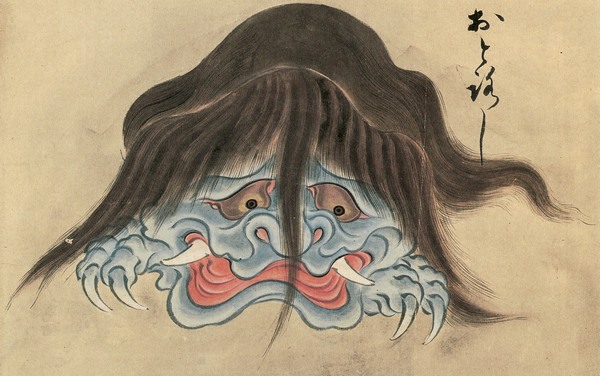Karakasa-obake
Summer moon walking /
Over a silent village /
The sound of hopping //
–
Breeze brushing on paper skin /
Bamboo bones showing /
Single foot hopping behind //
–
A lone, young peasant /
Walks on a dimly, lit road /
Fear rules over sounds //
–
Eye bulging in the paper /
Pressing on the man /
When he turns around //
–
Umbrella’s tongue fat with drool /
Sliding on his face /
The peasant falls with white eyes //
–
The paper lantern laughs /
To see a playful sport //
– – – – – – – – – – – – – – – – – – – – – – – – – – – – – – – – – – – – – – – – – – – – – – – – – – – – – – – – – – – – – – – –
– – – – – – – – – – – – – – – – – – – – – – – – – – – – – – – – – – – – – – – – – – – – – – – – – – – – – – – – – – – – – – – –
As the likes of Toy Story and The Brave Little Toaster have taught us, inanimate objects tend to have fantastic adventure when humans aren’t looking. The harsh truth is that this concept is hardly new, because the Japanese have been using this concept for generations.
Say hello to the Tsukumogami (lit. artifact spirits).
The Tsukumogami are a whole class of yōkai. According to legend, common items (things such as tools, clothes, household things, musical instruments, etc.) can develop souls and become self-aware, living yōkai after reaching 100 years of age. Tsukumogami is a collective name and is written with following kanji in Japanese:

While the name means “99-year gods,” the kanji used in this name imply attachment and misery. An object that is considered to be abused, abandoned, or neglected in some way has a higher chance of becoming a Tsukumogami. They enjoy pranking and terrorizing humans as revenge for the years of abuse and neglect they suffered before animating.
Two of the most common Tsukumogami are the Karakasa-obake (lit. paper umbrella ghost) and Chōchin-obake (lit. paper lantern ghost) (as pictured above). When either a paper umbrella or a paper lantern hit the century milestone, they develop a self-aware soul, as well as a large eyeball and a long, protruding tongue. They are generally prankish in nature, and their preferred method in scaring humans is the element of surprise, rolling their eyes and licking humans with their tongues. Yuck!
Unless you want your old desk to trample you, you better give your antiques a nice cleaning so they don’t come back to scare the hell out of you.
To quote a certain Pixar cowboy, “play nice!”
Until next time, see ya!
NOTE: Pictures of Karakasa-obake and Chōchin-obake are property of Matthew Meyer





